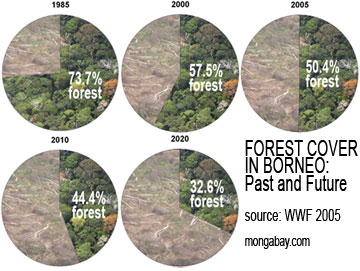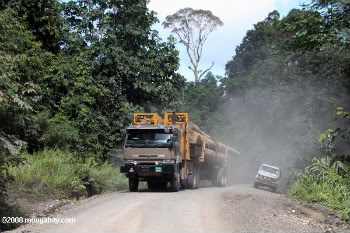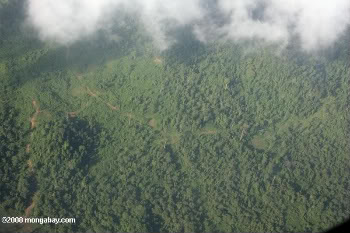An independent review of Interhill Logging found that the Sarawak logging company has regularly violated forest laws and abused the rights of the indigenous Penan peoples.
The review, conducted by French tourism giant ACCOR, found that Interhill Logging had not received free, prior, and informed consent from the local Penan people for its logging operations; the logging being done by Interhill “is very definitely not sustainable”; the company is not fully compiling with Sarawak’s Natural Resources and Environment Board; and Interhill is providing no long-term benefits to the Penan peoples.
The review declined to comment on allegations that Interhill employees had been sexually abusing Penan women and young girls, citing that an official police investigation was looking into the issue.
 |
A press release from the Bruno Manser Fonds, which works to defend the rights of the Penan people, says that while the organization welcomes the indepnedent review, “it must, however, be borne in mind that Interhill – and subsequently ACCOR as its business partner – will be judged by deeds and not by mere words.”
The French hotel company, ACCOR, was pressured into conducting this review after it received criticisms from several fronts—including Bruno Manser Fonds—for partnering with Interhill on a 23 story luxury hotel in Kuching, despite the on-going conflict between the company and the Penan peoples.
According to the review, the forest in the Middle Baram region has been anything but sustainably managed. Interhill began logging in the 61,000 hectare (150,000 acre) concession in 2002, however during the ten years before this the forest had already been logged twice by another logging company. Interhill currently has access to the forest for logging until 2013 and it expects to log 940,000 cub metres of logs (or 20 tons per hectare), but the forest had already lost 2.2 million cubic meters (60 tons per hectare) in the dozen years prior.
 Loggers’ truck using logging road in Malaysian Borneo. Photo by: Rhett A. Butler. |
“Logging in natural forest on such short cycles is very definitely not sustainable as can be seen from the reduced harvest volumes being achieved by Interhill compared to the much higher volumes achieved ten years ago,” cites the report.
The state of Sarawak allows such short cycles of logging, unlike Peninsula Malaysia and Indonesia which do not allow re-entry into a forest for logging until 35 years has passed.
Besides being unsustainable, the review found that the Penan peoples were the losing party in the logging scheme. The review begins by stating that the Penan people have received the benefit of roads, improved transportation, and some jobs, however the review says that “there is no inherent long-term development advantage” for the Penan people, adding that “when Interhill eventually completes the logging and presumably withdraws from the concession area, the Penan will be deprived of the current benefits received and are unlikely to have achieved much to elevate themselves from their current status, described by the Marudi District Officer as being among Malaysia’s hard-core poor.”
Even the compensation given to the Penan peoples appears to have been handed out arbitarily with some communities saying they have received no compensation whatsoever for the loss of their forest. Interhill has failed to keep any records of compensation given.
In addition the reviews states that “field observation indicated that full compliance [Sarawak’s Natural Resources and Environment Board] with was not being achieved and in some cases was minimal or absent”. However, the review does not cite which compliances are not being met by Interhill
 Aerial view of heavily logged rainforest in Malaysian Borneo. Photo by: Rhett A. Butler. |
Part of the blame is laid on Sarawak’s government and enforcement agencies. Official inspections of Interhill’s operations, according to the review, “do not appear to be routinely conducted and are perhaps only very cursory” and that “the pressure to comply with legally required terms and conditions is not great.”
Conflict has arisen between the Penan people and Interhill Logging due to allegations that the company has logged community reserves, felled fruit and poison-dart trees which are vital for the Penan people, polluted fresh water supplies, not paid adequate compensation, and refused to be transparent about the quantity it is logging.
“For a company like Interhill, corporate social responsibility must first and foremost mean respecting the free, prior and informed consent (FPIC) of the local communities. All measures must be undertaken from a long-term perspective, permitting the local communities to engage in sustainable development in what is already a heavily damaged forest environment, even after the expiry of the current logging licence in 2013,” stated the Bruno Manser Fonds.
The organization asks that Interhill scales down its logging operations, take-out all machinery from areas where they lack indigenous community’s consent, remove any employees who have been accused of sexual abuse or intimidating communities, fully cooperate with the police investigation into the alleged sexual abuse, acknowledge the Penan people’s legitmate cliam on the forest and to stop fighting this claim legally, and, finally, stop denying that sexual abuse is a serious problem for indigenous communities.
Despite the findings against the company, the review found that the Penan people stated that “Interhill operates in a more agreeable manner than either its predecessor or companies operating in neighbouring timber concessions.”
The Burno Manser Fonds has heard the same from the Penans: “among the logging companies active in Sarawak, Interhill is a medium player, and other companies might engage in even worse behaviour. The Penan point, in particular, to misdeeds committed by Rimex, a company that had been logging the area before 2002, and by Samling, a multinational logging giant that is active in several adjacent concessions and shares logging roads and a timber camp with Interhill.”
Related articles
Penan tribe to continue blockade against loggers with blowpipes and spears
(09/01/2009) A meeting between the Penan indigenous tribe, Malaysian government officials, and representatives of a logging company ended without an agreement on Friday. After the meeting, a Penan spokesman declared that the group’s blockade would continue. Blockaders, dressed in traditional garb, have armed themselves with blowguns and spears.
Forest people set up logging blockades in Borneo
(07/31/2009) Indigenous Penan have set up roadblocks in Malaysian Borneo to stop loggers from encroaching on their rainforest land, reports Survival International, an indigenous rights’ group.
ACCOR hotel chain linked to destructive logging in Borneo?
(02/23/2009) ACCOR, one of Europe’s leading hotel groups, is cooperating with a Malaysian logging company blamed for destructive logging and attacks on Penan indigenous communities in Sarawak, claims an environmental group that has long campaigned on behalf of Borneo’s forest people. The Switzerland-based Bruno Manser Fund reports that NOVOTEL is jointly building a 4.5-star hotel in the Sarawak capital of Kuching with the Malaysian tropical timber company, Interhill.